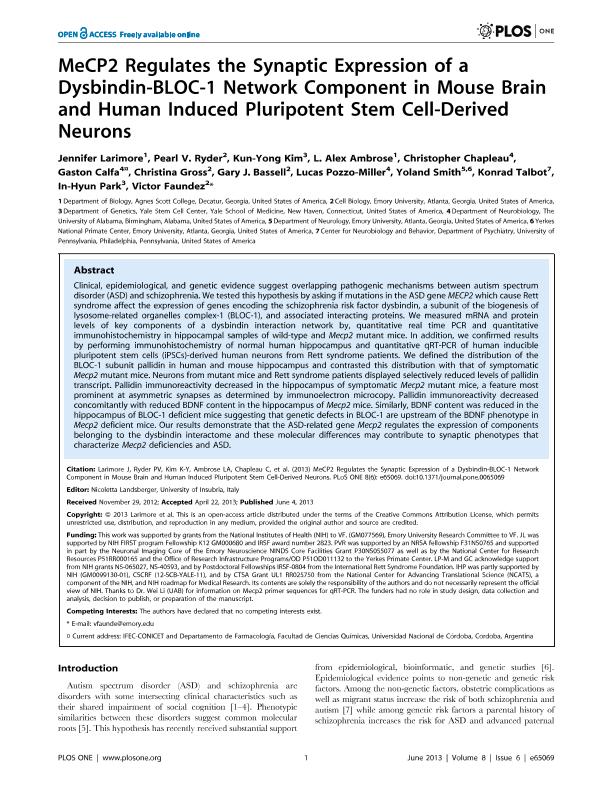Artículo
MeCP2 Regulates the Synaptic Expression of a Dysbindin-BLOC-1 Network Component in Mouse Brain and Human Induced Pluripotent Stem Cell-Derived Neurons
Larimore, Jennifer; Ryder, Pearl V.; Kim, Kun Yong; Ambrose, L. Alex; Chapleau, Christopher; Calfa, Gaston Diego ; Gross, Christina; Bassell, Gary J.; Pozzo Miller, Lucas; Smith, Yoland; Talbot, Konrad; Park, In Hyun; Faundez, Victor
; Gross, Christina; Bassell, Gary J.; Pozzo Miller, Lucas; Smith, Yoland; Talbot, Konrad; Park, In Hyun; Faundez, Victor
 ; Gross, Christina; Bassell, Gary J.; Pozzo Miller, Lucas; Smith, Yoland; Talbot, Konrad; Park, In Hyun; Faundez, Victor
; Gross, Christina; Bassell, Gary J.; Pozzo Miller, Lucas; Smith, Yoland; Talbot, Konrad; Park, In Hyun; Faundez, Victor
Fecha de publicación:
04/06/2013
Editorial:
Public Library of Science
Revista:
Plos One
ISSN:
1932-6203
Idioma:
Inglés
Tipo de recurso:
Artículo publicado
Clasificación temática:
Resumen
Clinical, epidemiological, and genetic evidence suggest overlapping pathogenic mechanisms between autism spectrum disorder (ASD) and schizophrenia. We tested this hypothesis by asking if mutations in the ASD gene MECP2 which cause Rett syndrome affect the expression of genes encoding the schizophrenia risk factor dysbindin, a subunit of the biogenesis of lysosome-related organelles complex-1 (BLOC-1), and associated interacting proteins. We measured mRNA and protein levels of key components of a dysbindin interaction network by, quantitative real time PCR and quantitative immunohistochemistry in hippocampal samples of wild-type and Mecp2 mutant mice. In addition, we confirmed results by performing immunohistochemistry of normal human hippocampus and quantitative qRT-PCR of human inducible pluripotent stem cells (iPSCs)-derived human neurons from Rett syndrome patients. We defined the distribution of the BLOC-1 subunit pallidin in human and mouse hippocampus and contrasted this distribution with that of symptomatic Mecp2 mutant mice. Neurons from mutant mice and Rett syndrome patients displayed selectively reduced levels of pallidin transcript. Pallidin immunoreactivity decreased in the hippocampus of symptomatic Mecp2 mutant mice, a feature most prominent at asymmetric synapses as determined by immunoelectron microcopy. Pallidin immunoreactivity decreased concomitantly with reduced BDNF content in the hippocampus of Mecp2 mice. Similarly, BDNF content was reduced in the hippocampus of BLOC-1 deficient mice suggesting that genetic defects in BLOC-1 are upstream of the BDNF phenotype in Mecp2 deficient mice. Our results demonstrate that the ASD-related gene Mecp2 regulates the expression of components belonging to the dysbindin interactome and these molecular differences may contribute to synaptic phenotypes that characterize Mecp2 deficiencies and ASD.
Palabras clave:
Mecp2
,
Rett Syndrome
,
Synapsis
,
Bdnf
Archivos asociados
Licencia
Identificadores
Colecciones
Articulos(IFEC)
Articulos de INST. DE FARMACOLOGIA EXPERIMENTAL DE CORDOBA
Articulos de INST. DE FARMACOLOGIA EXPERIMENTAL DE CORDOBA
Citación
Larimore, Jennifer; Ryder, Pearl V.; Kim, Kun Yong; Ambrose, L. Alex; Chapleau, Christopher; et al.; MeCP2 Regulates the Synaptic Expression of a Dysbindin-BLOC-1 Network Component in Mouse Brain and Human Induced Pluripotent Stem Cell-Derived Neurons; Public Library of Science; Plos One; 8; 6; 4-6-2013; 1-6; e65069
Compartir
Altmétricas



